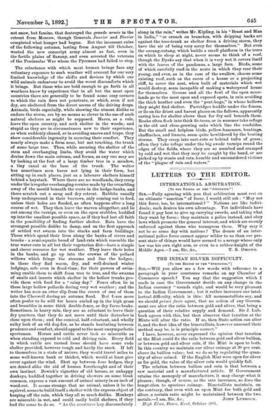THE INDIAN SILVER DIFFICULTY.
[TO THE EDITOR OE THE " BPECTLTOR."]
SIR,—Will you allow me a few words with reference to a paragraph in your courteous remarks on my Chamber of Commerce speech P You say that the suggestion which I made in case the Government decide on any change in the Indian currency " sounds right, and would be very pleasant to the Indian Government ; but it rather increases our intel- lectual difficulty, which is this : All monometallists say, and we should prima facie agree, that no action of any Govern- ment can alter the ratio between gold and silver, that being a question of their relative supply and demand. Sir J. Lub- bock agrees with this, but then observes that taxation at the Mints will alter the ratio. If so, then State action can alter it, and the first idea of the bimetallists, however unsound their method may be, is in principle correct."
I have, however, never expressed the opinion that taxation at the Mint could fix the ratio between gold and silver bullion, or between gold and silver coin, if the Mint is open to both. In this country we maintain our silver coinage at 30 per cent. above its bullion value; but we do so by regulating the quan- tity of silver coined. If the English Mint were open for silver as for gold, the value of the silver coin would quickly fall.
The relation between bullion and coin is that between a raw material and a manufactured article. If Government retains the monopoly of manufacture, it may charge what it pleases ; though, of course, as the rate increases, so does the temptation to spurious coinage. Bimetallists maintain, on the contrary, that even with an open Mint for both gold and silver, a certain ratio might be maintained between the two






















































 Previous page
Previous page